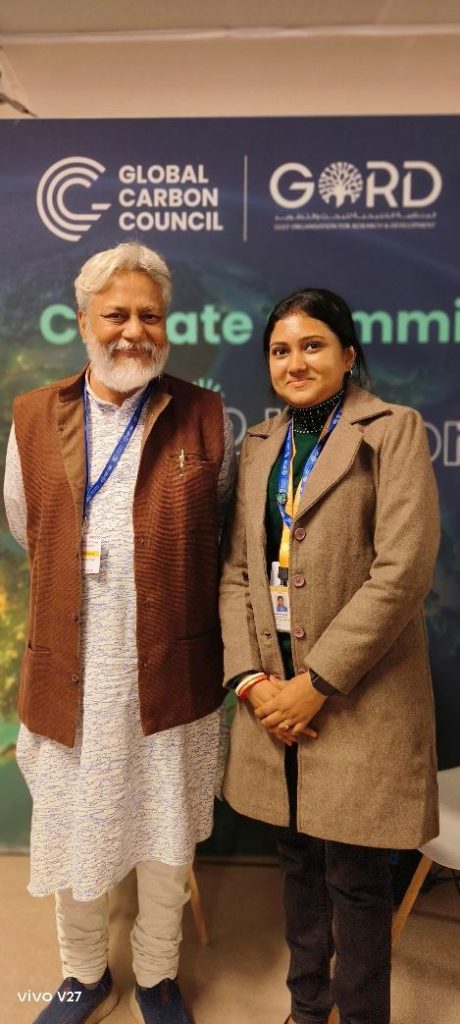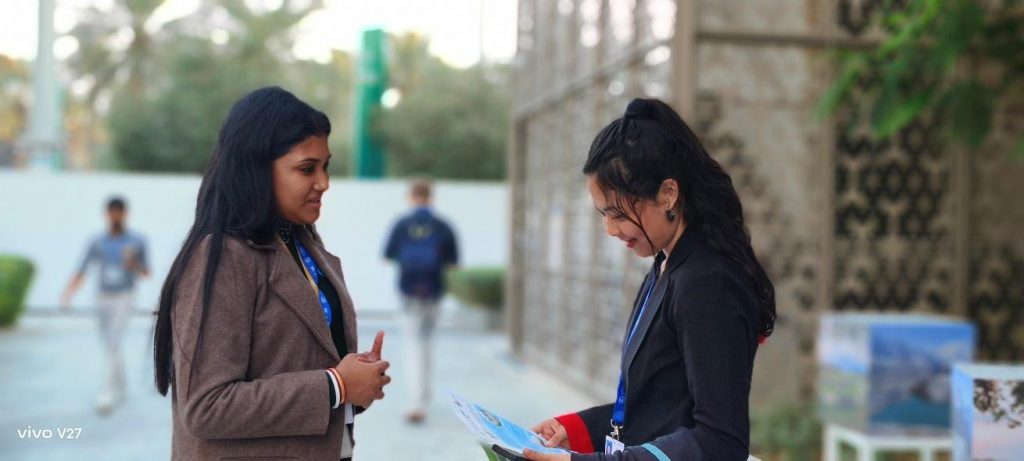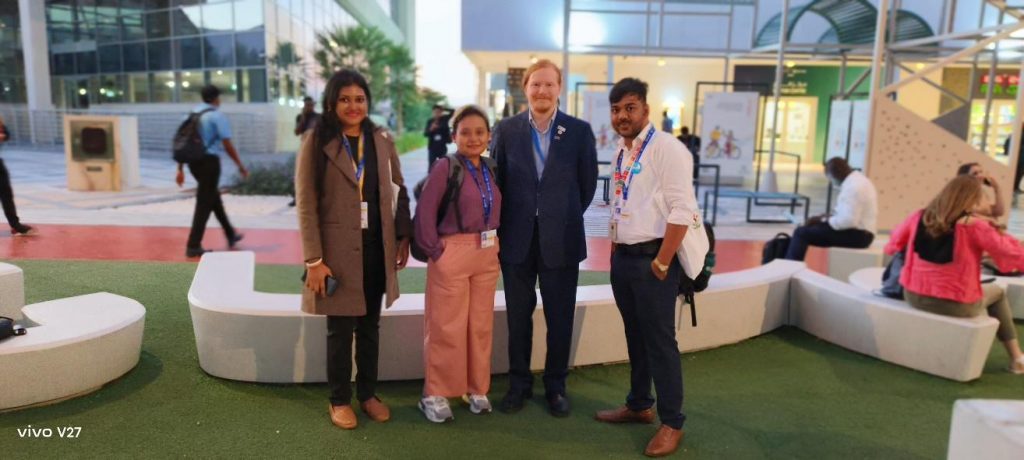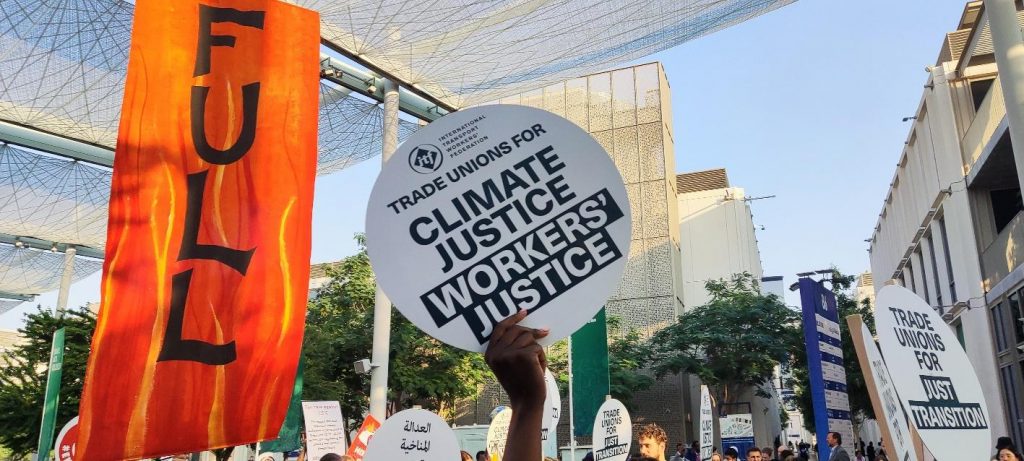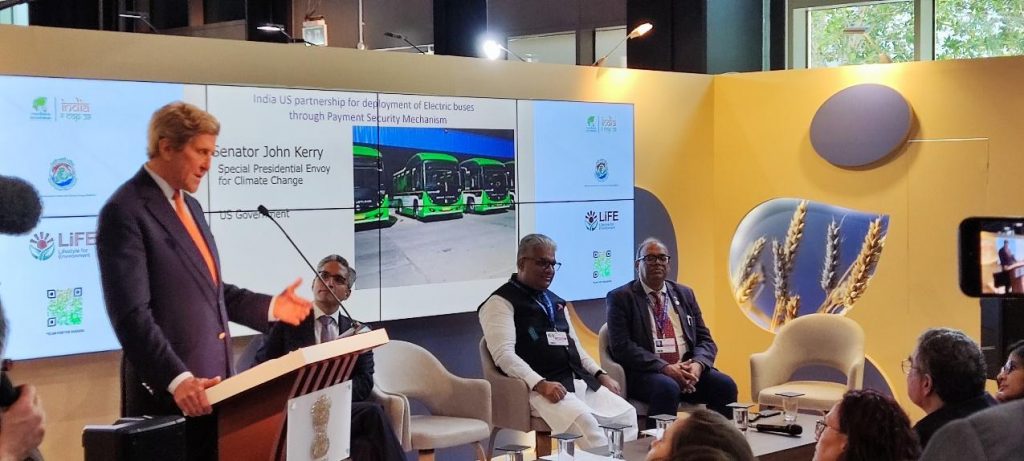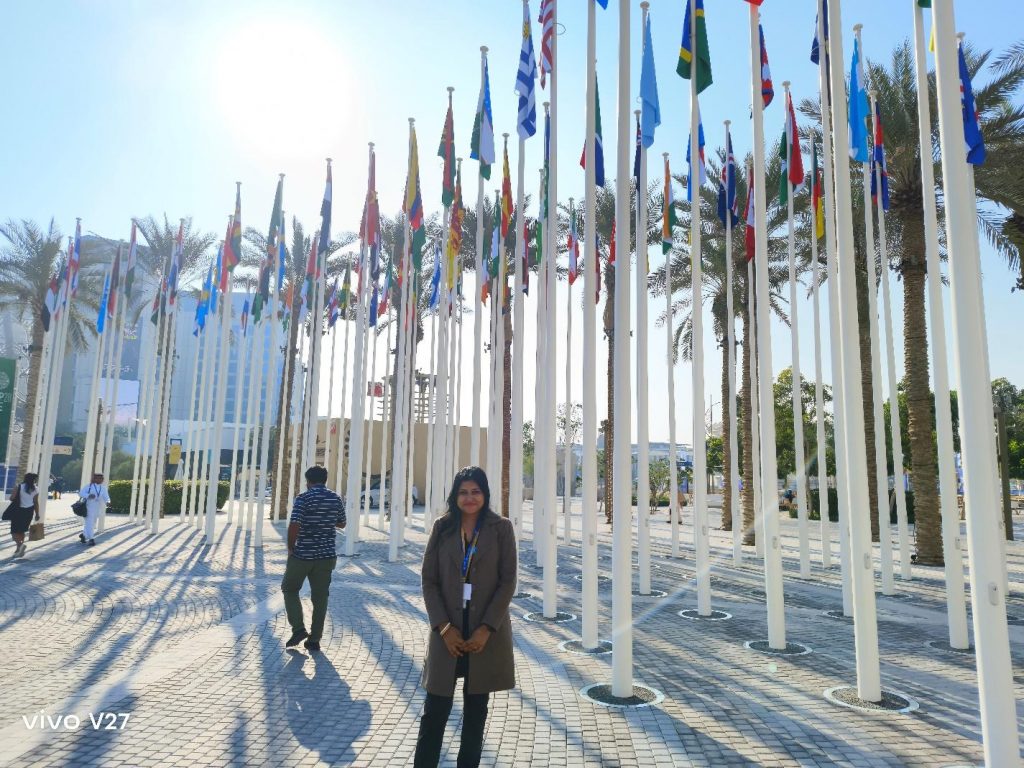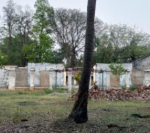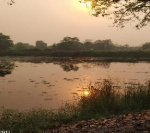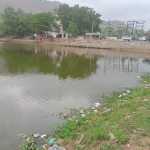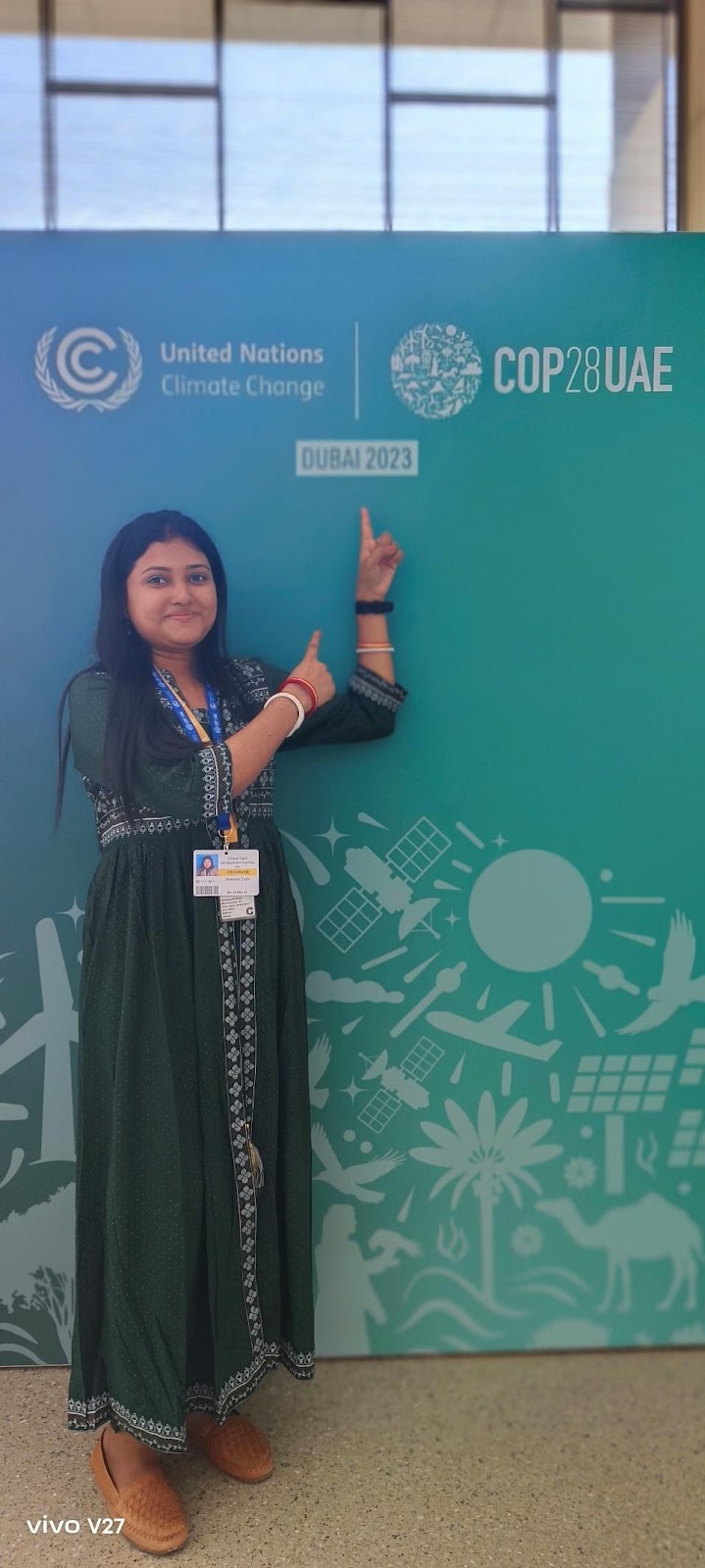
As a young person deeply invested in the future of our planet, I had the privilege of participating in the Conference of Parties (COP 28) held in Dubai, I had an experience that was nothing short of surreal. This experience was made possible through my involvement with the Youth4Water Plus campaign, a UNICEF Odisha-based initiative aimed at sensitizing youth on Water, Sanitation, and Hygiene (WASH) and climate issues. The COP 28 event was vibrant with youthful energy, as young activists from around the globe staged protests and voiced their opinions both on and off stage. Their demands were crystal clear: climate action was needed, and it was needed now.
Odisha’s Battle with Nature’s Turmoil & Climate Action Initiatives
Hailing from Mayurbhanj district in Odisha, India, I have been a keen observer of the climate’s wrath. I have witnessed cyclones so powerful that they uproot trees and anything that comes in their path. The disappearance of forested land has led to an increased incidence of heatwaves. Erratic rainfall patterns have rendered agricultural lands, like my grandfather’s, unproductive. The shrinking of river rivulets in town areas has resulted in urban flooding.
Odisha, located on the eastern part of India, has been grappling with nature’s turmoil since time immemorial. From the super cyclone of 1999 to several cyclones that have impacted the land and destroyed many lives, the state has learned to live with these disasters. About 80% of our state is prone to one or more forms of natural disasters. The normal rainfall of the state is 1451.2 mm, with 75% to 80% of rainfall received from June to September. Not only cyclones, but Odisha also grapples with heatwaves, erratic rainfalls, floods, and drought-like situations. In fact, Odisha has encountered 28 flood years and 19 drought years between 1955 to 2008. Major work by the state government on preparedness during disasters has increased resilience and enabled swift action.
Our state has faced at least 16 natural disasters, including 10 cyclones in the past 12 years. Despite this, our years of planning and preparation have paid off as fatalities from powerful cyclones never crossed double digits. In 2013, when Cyclone Phailin hit the coast, Odisha executed one of the world’s most effective disaster management operations, relocating nearly a million people.
The Odisha State Disaster Management Authority (OSDMA) works in tandem with other line departments to address issues related to disasters. In the wake of the Super Cyclone in 1999, Odisha became the first state in India to establish a disaster management authority. The OSDMA conducts two massive community-led mock drills across the state every June and November, mobilizing several government departments, district collectors, gram panchayats, NGOs, and thousands of trained volunteers. In response to these urgent matters regarding climate change, Odisha has also come up with the State Action Plan on Climate Change (SAPCC), a climate budget, and a climate change cell associated with the Department of Environment, Forest & Climate Change
Youth is the present & future
Youth are not just the future; we are the present. In Odisha, nearly 34% of the population is aged between 15 and 34. In India, the youth (aged 15–29 years) comprise 27.2% of the country’s overall population. Globally, young people make up about 16% of the world’s population. These figures underscore the significant role that young people play in shaping the world.
The Conference of the Parties (COP) is the highest authority of the United Nations Framework Convention on Climate Change (UNFCCC), responsible for making key decisions. Since its inception in 1995, the COP has been instrumental in shaping global climate policy and fostering international cooperation. Over the years, the COP has seen significant milestones, including the adoption of the Paris Agreement at COP 21.
Parallel to the COP, youth-led initiatives such as the Conference of Youth (COY), Regional Conference of Youth (RCOY), and Local Conference of Youth (LCOY) have emerged. These platforms empower young people to voice their concerns and contribute to the climate dialogue.
All About COP 28
As an attendee of the 28th Conference of the Parties (COP 28), I was deeply moved by the collective commitment to climate action. The conference, held in Dubai, was a beacon of enlightenment, illuminating the path forward for global climate initiatives. During the conference, I learned about current climate issues and shared the work of the Youth4Water Plus campaign. I had the opportunity to meet with Bhupender Yadav, Union Cabinet Minister of Labour and Employment, Environment, Forest and Climate Change in the Government of India, who gave his blessings to the youth. I also met with Archana Varma, the Mission Director of the National Water Mission (NWM), Rajendra Singh, Waterman of India, and Srichchha Pradhan, Miss Nepal World 2023. These interactions strengthened my resolve and provided a platform to share insights and strategies for effective climate action. At COP28, I focused on two areas close to my heart: Nature, Land use, and Oceans; and Food, Agriculture, and Water. The conference concluded with a landmark agreement where nearly every country committed to transitioning away from fossil fuels, the main driver of climate change.
The conference was organized around four pillars: fast-tracking a just, orderly, and equitable energy transition; fixing climate finance; focusing on people, lives, and livelihoods; and underpinning everything with full inclusivity. The discussions and commitments made at COP 28 were a testament to the power of collective action in addressing the climate crisis.
One of the most significant aspects of COP 28 was the emphasis on networking. The Global Climate Action space at COP 28 provided a platform for governments, businesses, and civil society to collaborate and showcase their real-world climate solutions. The COP 28 Platform was a space where participants could watch and join meetings, network with other participants, and create self-service online meetings. Youth advocacy was at the forefront of COP 28. Young activists for climate change urged government officials to place the world’s almost 2 billion children at the forefront of their policies. The COP 28 Presidency recognized the urgency of ensuring that the “voices of youth are front and center at COP 28”. The COP 28 Youth Climate Champion set out priorities, including defining a sustainable, holistic model for meaningful youth engagement for all future COPs.
Amidst the physically demanding days, where I walked approximately 15 kilometres daily, the discomfort in my legs became an unexpected catalyst for effective networking. Engaging with indigenous people from the Amazon Forest in Brazil and meeting youth delegates from countries such as Malaysia, Indonesia, Bangladesh, Benin, Morocco, Dubai, Jordan, Austria, Turkiye, and Saudi Arabia allowed for a fresh perspective on the global climate scenario. Interactions with diverse individuals at COP 28 stalls and discussions with UN officials further enriched my understanding of how different regions are addressing climate challenges. The spirit of cross-learning, unlearning, and knowledge sharing was palpable, contributing to the enrichment of my knowledge hub by the end of the COP 28 journey.
In India, the state of Odisha has taken similar initiatives. Acknowledging the danger of the climate crisis, Odisha was among the pioneer states in the nation to develop an all-encompassing and collaborative state action plan, engaging a variety of stakeholders. During 2020-21, it became the first state in India to introduce a budget focused on climate. The Odisha Climate Change Action Plan outlines strategies across various sectors, including agriculture, coast and disaster, energy, fisheries and animal resources, forests, health, industries, mining, transport, urban, and water resources. These sectors lay the groundwork for conducting the Phased Climate Change Impact Appraisal.
COP 28 was a significant step forward in the global fight against climate change. The emphasis on networking and youth advocacy, coupled with similar initiatives in regions like Odisha, India, underscore the collective commitment to a sustainable future. As we move forward, it is crucial that we continue to prioritize these efforts and work together to mitigate the impacts of climate change.
Way Forward
The final negotiations of COP 28, held in Dubai, UAE, were a significant step towards global climate action. Here are some key outcomes:
Climate Finance: President Mohammed bin Zayed Al Nahyan of the UAE unveiled a $30 billion fund aimed at global climate solutions, with a goal to draw in $250 billion in investments by the end of the decade. Additionally, the COP participants committed $700 million to aid countries with lower incomes in dealing with the losses and damages due to climate change.
The Future of Food: Over 130 countries pledged to incorporate emissions from agriculture and farming into their national climate change mitigation plans. Moreover, a consortium of more than 25 top food and agriculture organizations united to promote regenerative agriculture.
Renewable Energy: A group of 118 countries concurred on objectives to triple the capacity of renewable power generation to 11,000 GW and to double energy efficiency within this decade.
Global Stocktake: In a demonstration of global solidarity, negotiators from nearly 200 Parties came together with a decision on the world’s first ‘global stocktake’ to ratchet up climate action before the end of the decade.
These outcomes represent a collective commitment to address climate change and keep the global temperature limit of 1.5°C within reach.
COP28 faced several criticisms as well including the Controversial Presidency as the COP President, Sultan Al-Jaber, is the head of the Abu Dhabi National Oil Company. His appointment was widely criticized because his oil company is expected to rapidly expand production this decade. Despite this, he argued that he was uniquely well-placed to push for action from the oil and gas industry. The conference was attended by about 2400 delegates from fossil fuel companies. Some fossil fuel-producing countries emphasized the potential to continue burning fossil fuels using carbon capture technologies that are untested at scale. The targets set by nations were inadequate to hold the world within the Paris temperature targets. If fulfilled, they would result in 3°C or more of warming, which would be disastrous. A loss and damage fund was agreed upon, which was a hard-won victory by developing countries. However, the $700m so far pledged by wealthy nations most responsible for the climate emergency covers less than 0.2% of what is needed every year. Sultan Al Jaber had said in a video call that there was “no science” indicating that a phase-out of fossil fuels was needed to restrict global heating to 1.5C (2.7F). This caused an outcry from climate scientists.
Despite all these controversies, COP 28 emerged as an enlightening platform, showcasing climate action at its best. The significance of effective networking cannot be overstated, as it provided a unique advantage to connect with individuals from various backgrounds and regions. The resounding theme of youth advocacy took center stage, with young activists playing a pivotal role in shaping the discourse on climate change.
Drawing inspiration from the global stage, I envision a similar initiative taking root in the state of Odisha, India. By leveraging the experiences and insights gained at COP 28, there is an opportunity to foster a culture of environmental awareness, collaborative action, and youth empowerment within the local community. The key is to translate the lessons learned on the global stage into tangible initiatives that address the unique climate challenges faced by Odisha. With youth at the forefront, the potential for transformative change is immense, and COP 28 has laid the groundwork for a future where collective efforts drive sustainable and resilient outcomes.
Anwesa Dutta, a Botany postgraduate from St. Xavier’s College, Mumbai, and a Water, Sanitation & Hygiene (WASH) postgraduate from TISS, Tuljapur, is a WASH consultant with UNICEF Odisha and a youth advocate in the Youth4Water Plus campaign. She works with Odisha’s youth on WASH and climate actions, and has been part of the organizing team for OCOY Odisha 2023. She also participated in LCOY India 2023, RCOY 2023, and COP 28 as a youth delegate. Anwesa, who hails from Mayurbhanj district of Odisha, is passionate about addressing agrarian crisis, climate change, and pollution. Her hobbies include bird watching, wildlife photography, cooking, and illustrating.
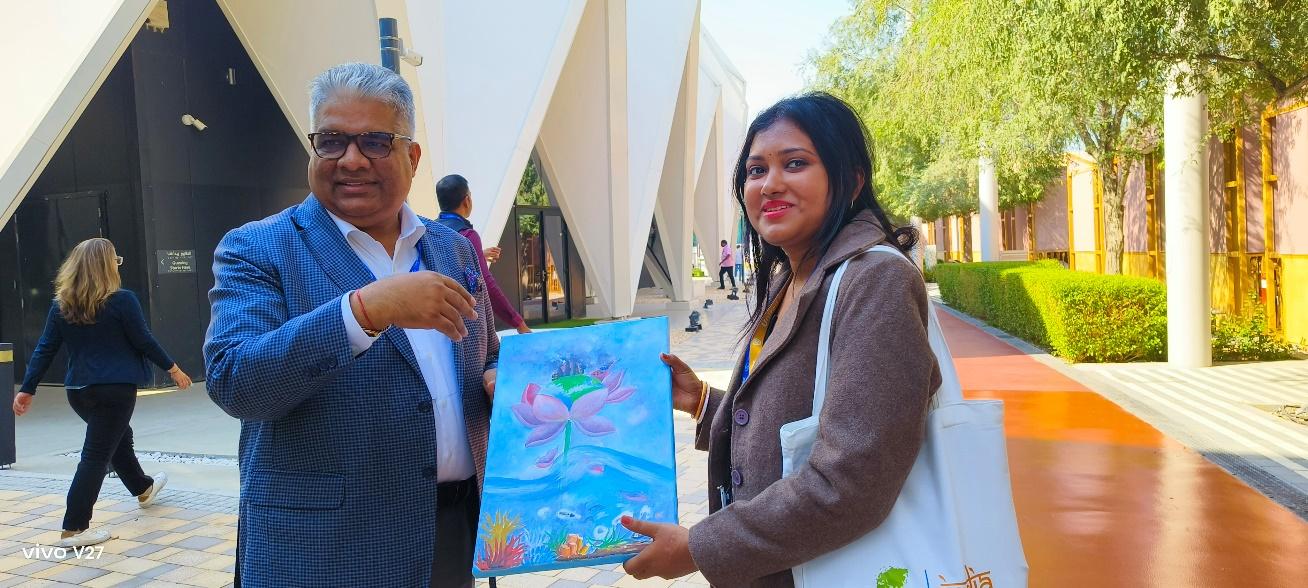
Presenting Youth4Water Plus Memento to Shri Bhupender Yadav, Union Cabinet Minister of Labour & Employment, Environmrnt, Forest & Climate Change, Government of India
